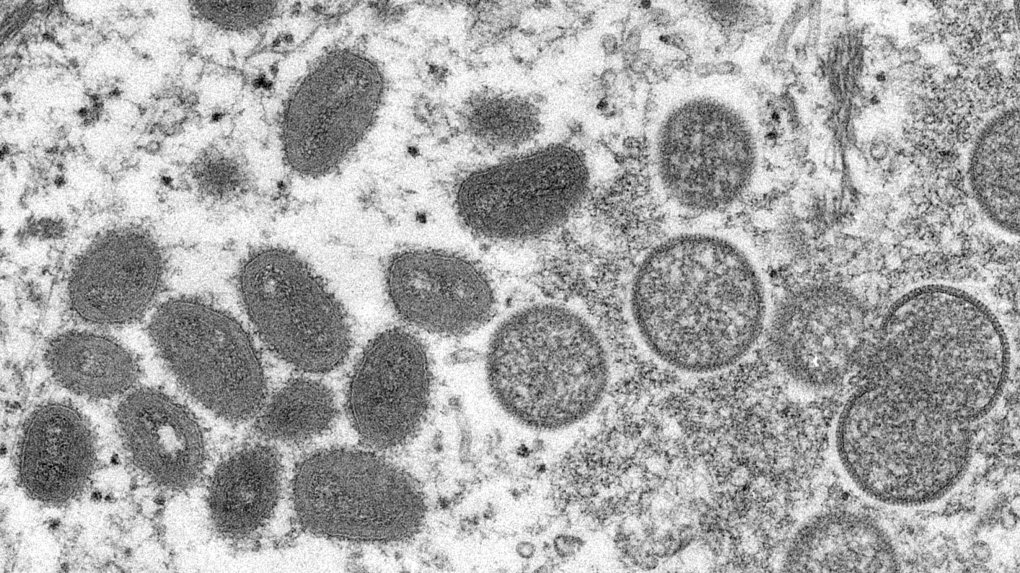
B.C. tenants evicted for landlord's use after refusing large rent increase to take over neighbouring suite
Ashley Dickey and her mother rented part of the same Coquitlam duplex in three different decades under three different landlords.
The World Health Organization announced Monday that "mpox" is now the preferred name for monkeypox.
"Both names will be used simultaneously for one year while 'monkeypox' is phased out," the organization said.
Monkeypox was named in 1970, more than a decade after the virus that causes the disease was discovered in captive monkeys, the organization said. The name was created before WHO published best practices for naming diseases in 2015.
Scientists and experts have pushed since the start of the recent outbreak to change the name to avoid discrimination and stigma that could steer people away from testing and vaccination.
In August, WHO encouraged people to propose new names for monkeypox by submitting suggestions to it website. WHO said Monday that the consultation process included experts from medical, scientific, classification and statistics advisory committees "which constituted of representatives from government authorities of 45 different countries."
"The issue of the use of the new name in different languages was extensively discussed. The preferred term mpox can be used in other languages," WHO said in its statement.
WHO said Monday that "monkeypox" will remain searchable in the International Classification of Diseases in order to allow access to historic information, and the one-year period when both will be used allows time for publications and communications to be updated.
So far, more than 81,000 monkeypox cases in 110 countries have been reported to WHO in the recent outbreak. WHO says the global risk remains moderate, and outside of countries in West and Central Africa, the outbreak continues to primarily affect men who have sex with men.

Ashley Dickey and her mother rented part of the same Coquitlam duplex in three different decades under three different landlords.
A man who fell into a crevasse while leading a backcountry ski group deep in the Canadian Rockies has died.
A new survey by Dalhousie University's Agri-Food Analytics Lab asked Canadians about their food consumption habits amid rising prices.
MPP Sarah Jama was asked to leave the Legislative Assembly of Ontario by House Speaker Ted Arnott on Thursday for wearing a keffiyeh, a garment which has been banned at Queen’s Park.
Charlie Woods failed to advance in a U.S. Open local qualifying event Thursday, shooting a 9-over 81 at Legacy Golf & Tennis Club.
As Donald Trump was running for president in 2016, his old friend at the National Enquirer was scooping up potentially damaging stories about the candidate and paying out tens of thousands of dollars to keep them from the public eye.
After Prime Minister Justin Trudeau said the federal government would still send Canada Carbon Rebate cheques to Saskatchewan residents, despite Saskatchewan Premier Scott Moe's decision to stop collecting the carbon tax on natural gas or home heating, questions were raised about whether other provinces would follow suit. CTV News reached out across the country and here's what we found out.
A Montreal actress, who has previously detailed incidents she had with disgraced Hollywood producer Harvey Weinstein, says a New York Court of Appeals decision overturning his 2020 rape conviction is 'discouraging' but not surprising.
Caleb Williams is heading to the Windy City, aiming to become the franchise quarterback Chicago has sought for decades.

Mounties in Nanaimo, B.C., say two late-night revellers are lucky their allegedly drunken antics weren't reported to police after security cameras captured the men trying to steal a heavy sign from a downtown business.
A property tax bill is perplexing a small townhouse community in Fergus, Ont.
When identical twin sisters Kim and Michelle Krezonoski were invited to compete against some of the world’s most elite female runners at last week’s Boston Marathon, they were in disbelief.
The giant stone statues guarding the Lions Gate Bridge have been dressed in custom Vancouver Canucks jerseys as the NHL playoffs get underway.
A local Oilers fan is hoping to see his team cut through the postseason, so he can cut his hair.
A family from Laval, Que. is looking for answers... and their father's body. He died on vacation in Cuba and authorities sent someone else's body back to Canada.
A former educational assistant is calling attention to the rising violence in Alberta's classrooms.
The federal government says its plan to increase taxes on capital gains is aimed at wealthy Canadians to achieve “tax fairness.”
At 6'8" and 350 pounds, there is nothing typical about UBC offensive lineman Giovanni Manu, who was born in Tonga and went to high school in Pitt Meadows.
 Pictured is an undated microscopic image of the mpox virus. (Cynthia S. Goldsmith, Russell Regnery/CDC/Reuters)
Pictured is an undated microscopic image of the mpox virus. (Cynthia S. Goldsmith, Russell Regnery/CDC/Reuters)